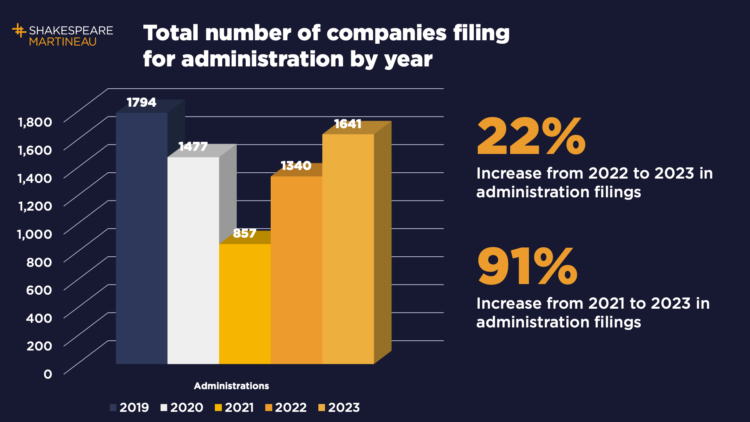
The retail sector accounted for 19 pe cent of administrations in 2023 – the highest industry in the UK – according to analysis by Shakespeare Martineau.
A total of 1,641 businesses, 239 of which came from the retail sector, filed for administration last year – marking a 22 per cent increase compared to 2022 and 91 per cent rise in comparison to 2021.
Retail, construction, hospitality, manufacturing, and real estate were the worst-hit sectors, collectively accounting for 59 per cent of the administrations.
Regionally, Greater London led the way with 22 per cent of the filings, followed by the North West (14 per cent) and South East (12 per cent), data from The Gazette Official Public Record has revealed.
While January (76) was the quietest month, administration numbers leapt to 177 in October – the most recorded for 43 months (185 in March 2020).

With administrations nearing pre-Covid levels (1,794), an insolvency and restructuring expert has warned that sustained difficult trading periods combined with rising geopolitical tensions means we could see more businesses failing throughout 2024.
Andy Taylor, partner and head of restructuring at Shakespeare Martineau, said: “The significant uptick in the number of companies filing for administration in 2023 underscores the challenges faced by businesses amid changing consumer habits, financial pressures, and geopolitical uncertainties.
“In the labyrinth of economic complexities, the retail sector in particular is bearing the brunt, noted by the collapse of major player Wilko. There has also been a reduction in housebuilding, which has a knock-on effect in the construction and real estate sectors.
“The cost of money, marked by high interest rates throughout 2023, exacerbates financial strains on businesses with models that thrived in a sub-2 per cent interest rate environment. Organisations can only bear that pressure for so long before its sustained impact starts to wash through and they begin running out of cash.
“A shift in consumer buying habits, exemplified by a challenging January for the hospitality sector, adds to the narrative of subdued spending. Moreover, HMRC continues to be more active, with threatened enforcement pushing businesses towards considering their options, and many opting for administration as an alternative to being wound up on a compulsory basis.
“The global stage, marked by geopolitical tensions in Russia-Ukraine and Israel-Gaza, contributes to economic uncertainty and suppressed growth. Businesses reliant on imports face increased outlays, as shipping companies opt to avoid the dangers of the Suez Canal and seek to pass on the extra costs of transport to customers.
“Many predict the rate of inflation to continue its downward trajectory in 2024, perhaps even approaching Bank of England’s target of 2 per cent. If that trend continues one might anticipate something like three interest rate cuts in 2024, which will hopefully stimulate growth. However, the economic landscape remains unpredictable, and our advice remains consistent – seeking professional advice early can open up more options for struggling businesses.
“It is crucial not to ignore the signs and bury your head in the sand and instead, take a proactive approach to address underlying issues. By doing so, businesses can better navigate the tough trading conditions and increase their chances of survival.”








Share